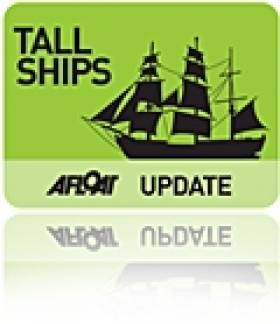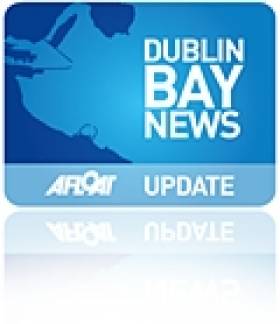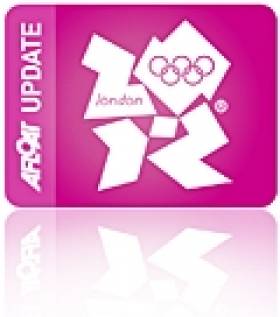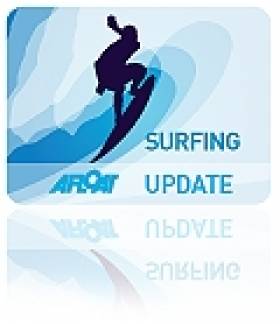Displaying items by tag: event
Entry List Announced for Tall Ships Races 2012
#TALL SHIPS - Eighteen vessels are on the entry list for the 2012 Tall Ships Races which are set to conclude in Dublin Port next August.
The list is dominated by British entries, with all nine UK tall ships expected to sail the third and final leg from A Coruña in northern Spain to Dublin.
Tall ships from Russia, Poland, France, Ecuador, Bulgaria, Latvia, Estonia and Belgium will also be in the fray when Ireland's capital hosts the final port of call for the 2012 races, presented by Szczecin in Poland and organised by Sail Training International - a charity established to harness sail training to develop and educate young people regardless of nationality, culture, religion, gender or social background.
The first leg of the 2012 races kicks off in Saint-Malo, France on 7 July with ships racing to Lisbon in Portugal (till 21 July); Cádiz in southern Spain (21-28 July) and A Coruña (28 July-12 August) before the final leg.
Dublin will be hosting the Tall Ships Races for the first time since 1998. Earlier this year Eamonn O’Reilly, CEO of Dublin Port Company, said he was “delighted to welcome the Tall Ships Races to Dublin Port" in 2012.
Since the announcement the port has already played host to the British tall ship Tenacious and the Norwegian vessel S/S Statsraad Lehmkuhl.
From Thursday 23 to Sunday 26 August 2012 as many as 100 ships are expected to arrive in the port and Docklands area for an event that includes a four-day festival programme of music, food and fashion showcases, markets, street theatre, water sport and water-based activities.
The weekend will also feature activities unique to the races including a crew parade, prize-giving event and a parade of sail.
Are you looking to get involved in Dublin's hosting of the Tall Ships Races? Check out the following links:
Become a trainee www.dublintallships.ie/trainees/
Take part as a volunteer www.dublintallships.ie/volunteers/
For further information see www.dublintallships.ie or e-mail [email protected]
Entry List for the Tall Ships Races 2012:
Akela (Russia)
Black Diamond Of Durham (UK)
Dar Mlodziezy (Poland)
Etoile Polaire (France)
Guayas (Ecuador)
Johanna Lucretia (UK)
John Laing (UK)
Kaliakra (Bulgaria)
Lord Nelson (UK)
Maybe (UK)
Moosk (UK)
Pelican Of London (UK)
Pogoria (Poland)
Rona II (UK)
Spaniel (Latvia)
St Iv (Estonia)
Thermopylae Clipper (UK)
Tomidi (Belgium)
Organisers of the Focus Ireland Triathlon in Dun Laoghaire on Sunday 31 July have announced a list of road closures in the area, and have also put out a call for volunteers to assist on the day.
Full road closures will be necessary from 7.45am to 11am in the Blackrock, Monkstown and Dun Laoghaire areas. A complete list plus a map of road closures and diversions are available to download below.
Meanwhile, volunteers are required to assist in all aspects of the event. Canoeists and kayakers are especially needed for safety support during the swimming section of the race.
Anyone who has some time to help out on the day, or who can supply canoes or kayaks for the event, is urged to contact events assistant Anne Griffin at [email protected].
Entries are still open for the Focus Ireland Triathlon, which comprises a 750m/350m swim, a 20k cycle and a 5k run. Registration is €80 for individuals/€240 for teams and entries can be made at www.focusireland.ie. For more details call 1850 204 205 or e-mail [email protected].
Ireland is on the entry list in six classes for the Weymouth and Portland International Sailing Regatta 2011, the London 2012 Olympic Test Event, that has been finalised today.
Ireland's leading hopes for a top result is in the Radial class where Annalise Murphy took bronze at the Sail for Gold regatta at the same venue. There's also high chances in the Star class with Peter O'Leary and David Burrows. Also sailing for Ireland is James Espey is in the Laser, Ross Hamilton in the Finn, Ger Owens and Scott Flannigan in the 470, Ryan Seaton and Matt McGovern in the 49er. A full entry list is available for download at the end of this post.
Sixty six nations have submitted the names of the 460 sailors who will test the conditions at Weymouth and Portland one year ahead of the London 2012 Olympic Sailing Competition.
For many of Member National Authorities there has been a selection headache with nations following game time rules where only one athlete per event is allowed.
In the Finn class Great Britain's Ben Ainslie was selected ahead of Giles Scott and Ed Wright, Spain's Marina Alabau received the nod ahead of Blanca Manchon and Anna Tunnicliffe (USA) lost out to Sally Barkow (USA).
The Women's Match Racers open the Weymouth and Portland International Regatta on 2 August 2011 with the start of their Round Robins. The Men's and Women's RS:X begin on 4 August followed by the Laser, Laser Radial and Men's and Women's 470 on 5 August before the Finn, 49er and Star sailors begin their competition on 6 August.
The London 2012 Olympic Games Sailing Competition will take place at the Weymouth and Portland Sailing Academy and Portland Marina, located in Dorset on the South Coast of England. Racing is scheduled to take place from 29 July to 11 August.At the 2012 Games sailing will introduce women's match racing for the first time. The racing format will be a single round-robin, quarter finals, semi-finals and then the finals. The nine fleet racing events will all sail an opening series before the top ten in each event contest a double-points Medal Race to decide the final positions. The Medal Races have a target time of approximately 30 minutes and will take place close to the shore at the Nothe to allow spectators ashore to get close up to the action.
Surfing in the Suburbs This Weekend
Top surfers are headed to Ireland's most unlikely surfing festival this weekend in Dublin.
The Evening Herald reports that landlocked suburb of Blanchardstown has been transformed into a South Pacific-style beach for the surf event, designed to promote Ireland's global surfing charms among the Irish themselves.
Pro surfers will compete on a wave machine for the 53 Degrees North Open Surf Championship, but the same waves will also be open to beginners and younger surfing wannabes.
Herald.ie has more in the story HERE.




























































